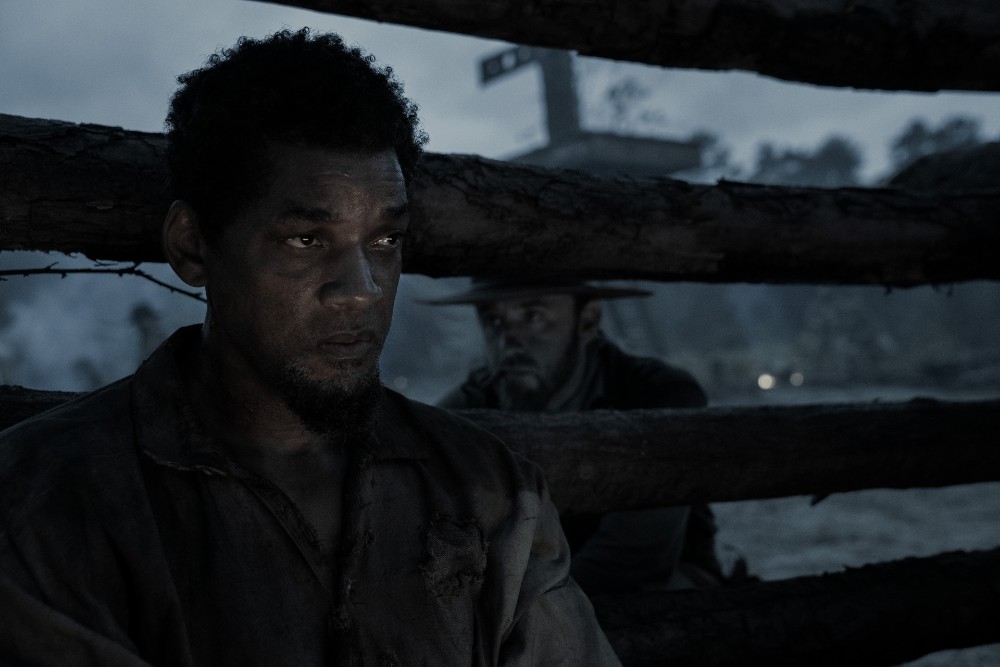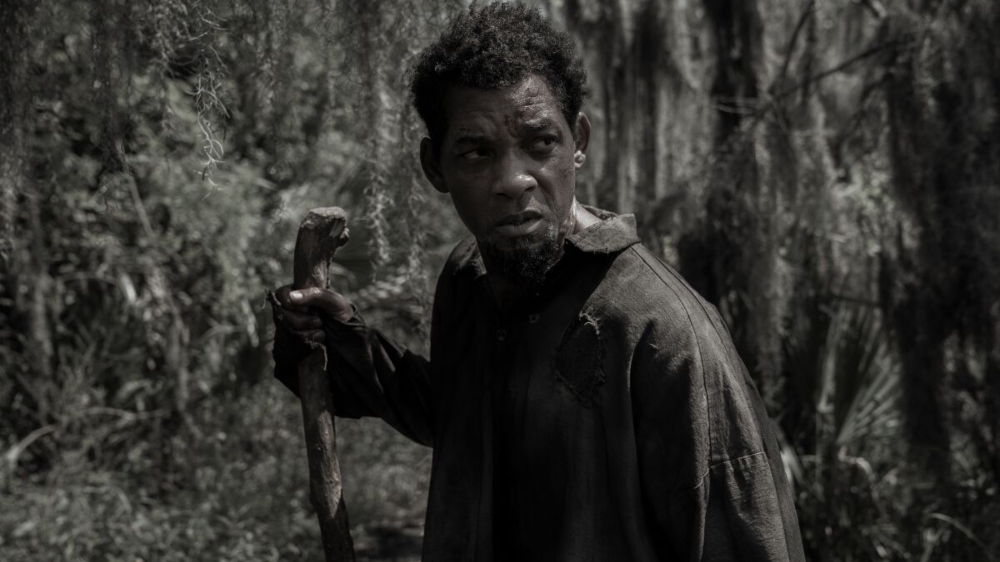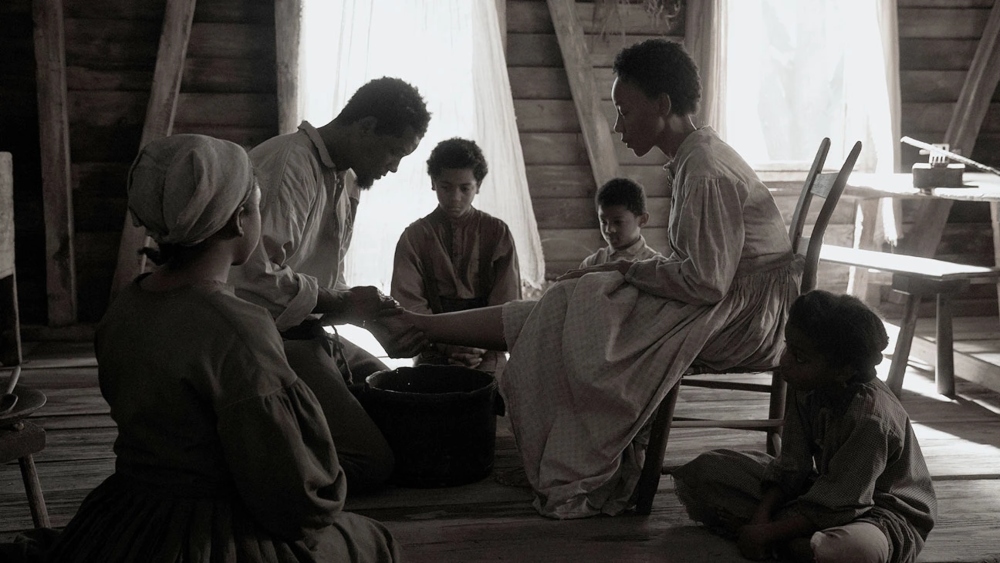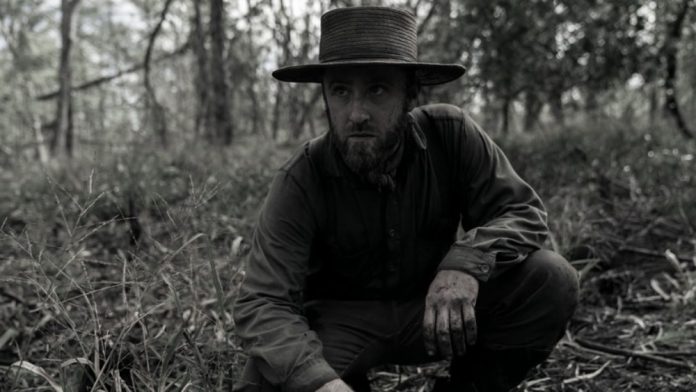Will Smith and director Antoine Fuqua walked a long, hard road to make their new Apple TV+ movie Emancipation, which stars Smith as Peter, an enslaved man of Haitian origin who manages to escape his plantation’s overseers after learning that President Abraham Lincoln has declared the Southern slaves to be free men.
The character of Peter is based on the man known around the world as “Whipped Peter,” who sat for a series of photos in 1863, including one particularly horrific image known as “The Scourged Back.” Emancipation follows Peter’s perilous journey across the dangerous swampland of Louisiana as he faces all sorts of obstacles while being chased by the ruthless and relentless slaver, Jim Fassel.
Chameleon-like actor Ben Foster (The Survivor, Leave No Trace) agreed to take on the thankless job of playing Fassel, a character so despicable and horrible in his treatment of Peter that Foster’s performance may remind viewers of Christoph Waltz in Inglourious Basterds or Ralph Fiennes in Schindler’s List. Emancipation is an equally tough film to watch, and Peter’s plight becomes even more daunting whenever he encounters Fassel and his tireless dog.
Emancipation continues an amazing run for Foster, who followed his impressive turn in Debra Granik’s 2018 drama Leave No Trace with Barry Levinson’s acclaimed Holocaust drama The Survivor, in which Foster played boxer Harry Haft. He also led the historical epic Medieval earlier this year and played a supporting role in Adam Sandler’s well-liked basketball drama, Hustle.
Emancipation should raise many new questions about the most insidious era in American history, and Above the Line had the opportunity to ask Foster some of these tough questions over Zoom earlier this week. Expect to hear his name in the Oscar race for Best Supporting Actor going forward as more people discover the film, which is now playing in theaters ahead of its Apple TV+ debut on Dec. 9.
Fair warning, a spoiler alert lurks below toward the end of the interview.

Above the Line: How did this project finds its way to you, and was it Antoine or Will who first approached you about playing Jim Fassel?
Ben Foster: I got a call that Mr. Fuqua wanted to have a chat, which is very exciting to me, as I’m a fan, [and] have been a fan. I then read the script, and I talked to my wife, and I just said, ‘I can’t do this movie. It’s an important story to tell, but right now, I just don’t want to be the face of that.’ Antoine still wanted to chat, so we got on the phone, and I said, ‘Why are you calling me for this role? I think I’m a nice guy. I got two kids at home.’ I [had] just finished a movie called The Survivor that dealt with a survivor from the Holocaust, and I just wasn’t in a mindset where I wanted to be the face of evil. He said one thing and that one thing — he said many things, but the thing that hit me was, “I want to lift the veil.” I said, ‘Much respect, deep respect, thank you for calling me. Let me know when you do a romantic comedy.’ This is on July 2, and I hung up and went about my day, and those words kept haunting me. “I want to lift the veil.”
I started researching. Sometimes, it takes a long time to figure a character out. It takes months and months and months. The script is very well written — it’s clever, but the character itself was very different than what we ended up doing. There were skulls on [him] with snake boots and what you would call a very juicy villain role, in all ways. On the 4th of July, I called Antoine, because it hit me — a vision of it. I was saying, ‘You want to lift the veil? Well, this is my thought. Let’s remove the skulls. Let’s take this man out of the south. We’ve seen racist white men doing unbelievably cruel things. Let’s put him in the Midwest. Let’s strip the caricature out. Let’s make him appear and sound like the guy next door. He could be a farmer, he could be a pastor, but his job is to chase, and to control. To me, that’s much scarier, and we will be in some way lifting the veil more,’ because racism is not born in the South. It is not excluded from the North, [so] by placing our version of Fassel in the middle of the country, [it] felt like a starting point. I felt, perhaps, I could help contribute to telling this tale in a way that felt meaningful.
ATL: Forgive me for not knowing, but was Jim Fassel based on a real person or is he a composite of multiple people?
Foster: Yes, he was written about as one of the most terrifying enslaved men hunters, and there were three of them. We couldn’t identify which one. Two were from the South, and one was from the Midwest, and that helped me because we could make our version and help support telling the [true] story. But yes, he was a legendarily dangerous man, and our interpretation was, we were going to set him in the plains, or, at least, his origin story.

ATL: That 4th of July that you spoke to Antoine and gave him suggestions for the character, was that last year or the year before?
Foster: The year before [2020]. It was the year of the hurricane that wiped out our set. It was a colorful and wild shoot.
ATL: Where did you end up shooting?
Foster: We shot in Louisiana, in the swamps. What was remarkable is, having done the film The Survivor, we went to Auschwitz in preparation. Have you ever been?
ATL: No, I haven’t. I’ve been to Germany with my parents — they were both German Jews — but never to Auschwitz, no.
Foster: When you go to a concentration camp, at least for me, I can speak [for] family [who] escaped the pogroms, it alters you. You feel it. It’s different than seeing a picture, let’s say that. Different than reading about [it], different than just seeing a film. It changes you. I had this similar feeling, walking on the plantations on which we shot, and it became all the more vivid, [given] the similarities, that our country must be held accountable.
ATL: I’m glad we’re having this conversation, and I’m sure it was hard for you to reenact that kind of cruelty. So what’s it like on set when you’re being so horrible to Will’s character all day, and then the camera stops rolling between takes and such? Are you able to set aside all of that violence and hatred or do you have to stay locked into character? And are you able to unwind at the end of the day? I’m just curious how you deal with the painful, difficult stuff you had to shoot during the day.
Foster: Well, it’s a curious question, because we’re actors. We’re make-believing with, I suppose, an athlete’s commitment. You want to go as far as you can. You want to jump as high as you can, you want to run as fast as you can. Whatever your sport is, at least the way that I experience the trade of being an actor is, leave it all on the mat. So unwinding wasn’t really part of that. You let it inform you. I will say, some people didn’t dig it. I loved shooting in Louisiana for the basic reason that it helped inform the performances, across the board. We have 110-degree heat [and] humidity, and crew members are dropping. We have poisonous snakes in the swamp right there, swimming by us. We have spiders that will kill you. They had to remove 40 alligators every morning from the set we were shooting on. For me, it makes my job easier — let me just be in service of telling this story.
[So] unwinding? No, I’d say the gift of the job, Edward, is, I suppose, similar to maybe a reporter doing a long investigation of questioning, and that interest draws you, and you allow yourself to be taken with it. This is not a dusty slave film; it was a film about freedom, it was a film about love, it was a film about perseverance, and it’s also a film about today. Getting the opportunity to spend six months, ultimately, working with the great Antoine Fuqua and Will and Charmaine [Bingwa], who I think just gives a staggering performance — they both do. Part of the pleasure of the job is a little bit of discomfort, I suppose.

ATL: Were there conversations you had with Will or Antoine, not necessarily about the movie or the shoot, but just about what was going on in the world today and how it related to Peter’s story?
Foster: Antoine and I, and Bill [Collage], our writer, talked a lot. We traded essays, and we were trying to get down to the core, at least with the character of Fassel, of ‘where does this racial violence come from?’ These are nervy subjects to talk about and ask questions [about], and getting to ask Antoine specifically, and trade essays by [James] Baldwin, [and] look at the speeches of Frederick Douglass… we came to a belief that the character of Fassel is not what you would say [is] a born racist. He learned racism, and to us, that was very exciting, I’d say, in a very, very morbid or challenging way — exciting and hopeful. Because if you can learn something, you can unlearn it. If you believe a baby is not born racist, that it is learned generationally, then you can begin to work backward.
[SPOILER ALERT GOING FORWARD]
ATL: If you do your job well, which I think you did, it adds to the authenticity of the movie. And because you did such a good job, I’d just say I was disappointed that Fassel wasn’t given a more painful death, as I was hoping his head would be ripped off and put on one of those spikes, or worse.
Foster: We talked a lot about that, and not to add spoilers here for those who haven’t seen the picture yet, but we spoke a great deal about the relentless matter-of-factness of racism and violence, and the way that death can come upon someone [and] can be so quick. It can just happen. Not to get too specific, but [Fassel] loses his voice, and these are subtle signals, but it was important to us. Of course, you want the big movie “cut him in half and throw him in the volcano!” [scene]…
ATL: Or feed him to the alligators, at least.
Foster: What I respect so much about Antoine is that he fought so [many] of those moments that may be expected, and challenged the idea of what a movie [on] this subject could be. I believe he’s made something so entertaining and timely. [Speaking] to other things outside the demise of Fassel is that we were sharing articles daily, [and talking about] what was [happening] on the border. We incorporated that when [Fassel] finds Peter on the horse, riding around [and] pulling him down. These images… we’re pulling and we were interweaving them into the film as we went, so it felt devastatingly current.
Emancipation is now playing in select theaters and will begin streaming on Apple TV+ on Dec. 9.



